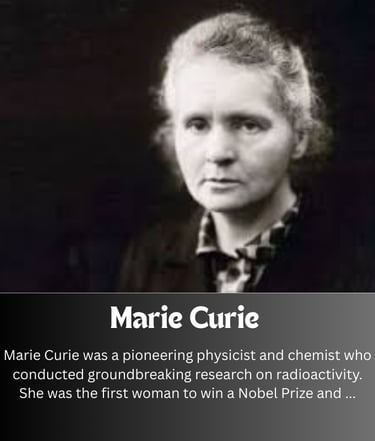Marie Curie
Marie Curie: A Resilient Pioneer
Marie Curie, born Maria Skłodowska in Warsaw, Poland, in 1867, was a trailblazing physicist and chemist. She is one of the most celebrated figures in the history of science, not only for her groundbreaking discoveries but also for her unwavering determination in a male-dominated world. Her life was a testament to the power of perseverance, leading her to become the first woman to win a Nobel Prize and the only person to win a Nobel Prize in two different scientific fields.
The Road to Discovery:
Early in her career, Curie's fascination with the work of Henri Becquerel on uranium rays led her to a new field of study. She coined the term "radioactivity" to describe the phenomenon of certain elements spontaneously emitting energy. Her relentless research, often conducted under difficult conditions in a makeshift laboratory, led to her most famous discoveries. In 1898, working with her husband, Pierre Curie, she discovered two new elements: polonium, named in honor of her native Poland, and radium, a highly radioactive element. The monumental task of isolating these new elements from tons of pitchblende ore—a task that took her years of painstaking work—demonstrated her unparalleled dedication.
A Double Nobel Laureate:
Curie's work on radioactivity brought her and her husband international recognition. In 1903, she, her husband, and Henri Becquerel were jointly awarded the Nobel Prize in Physics for their "joint research on the radiation phenomena discovered by Professor Henri Becquerel." This made her the first woman to ever win a Nobel Prize. Following her husband's tragic death in 1906, Marie continued their work alone. She took over his teaching post at the Sorbonne, becoming the first woman to hold that position. Her tireless research culminated in her second Nobel Prize, this time in Chemistry in 1911, for her "services to the advancement of chemistry by the discovery of the elements radium and polonium, by the isolation of radium and the study of the nature and compounds of this remarkable element."


A Lasting Legacy:
Beyond her scientific breakthroughs, Marie Curie's legacy extends to her humanitarian efforts. During World War I, she developed mobile radiology units, known as "petites Curies," to provide X-ray services to soldiers on the front lines, personally driving the vehicles to help wounded men.
Her work laid the foundation for modern nuclear physics and medicine. Her discoveries of radium and polonium paved the way for new cancer treatments, and her research has had a lasting impact on science and health care. Curie's life and work continue to be a source of inspiration, demonstrating that a curious mind and an unyielding spirit can change the world.
Discover the extraordinary and unique stories.
Inspire
© 2025. All rights reserved.
